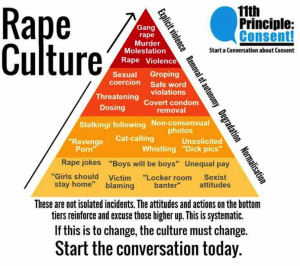Note: This post deals with themes of sexual harassment and assault. If you are looking for support at UBC, the Sexual Assault Support Centre (SASC), located on the 3rd floor of the UBC Student Nest, has a wide variety of resources for survivors, activists, and those looking to support a loved one who has experienced sexual assault. http://amssasc.ca/
Sexual harassment happens every single day all over the world. I find it hard to think of a woman I know who hasn’t been sexually harassed sometime in their life. On October 15, 2017, spurred by the sexual assault and harassment charges facing Harvey Weinstein, hundreds of thousands of women told their personal stories of sexual harassment and assault in the social media campaign #MeToo. On October 15, Alyssa Milano tweeted a photo that read “Suggested by a friend: If all the women who have been sexually harassed or assaulted wrote “Me too” as a status, we might give people a sense of the magnitude of the problem.” She then proceeded to tweet, “If you’ve been sexually harassed or assaulted write ‘me too’ as a reply to this tweet.” The sheer number of women who bravely shared their experiences with sexual harassment (within hours, over 200,000) was inspiring.
I would like to share my story today. I have met men who have tried and succeeded to harm me, through verbal and physical means. Like so many women I have felt feelings of guilt, pain and embarrassment that have influenced the way I behave and think. In a world where the majority of men are physically larger, it is easy for a woman to feel intimidated by a man’s sheer size, but every woman who has experienced some sort of threat of safety from a man feels apprehension on a deeper level. Some of the women I have talked to who have experienced sexual harassment have lost a part of themselves: hiding their body in baggy clothes, changing their phone number, developing trust issues. My coping mechanism has been checking over my shoulder, constantly, while walking.
This is not okay! I should not have to constantly be on guard, looking out and around me, in defence. To not feel safe in my own city, my own neighbourhood because of the insults that have happened to me by a man make me feel angry. They make me feel ashamed.
The most recent incident that happened to me was this past August. I was riding home on the bus and a man came and sat next to me. I held onto my purse tighter and looked out the window. I could feel something on my thigh but I thought it was just my bag. When I felt it move up towards my ass I jumped and saw the man’s hand touching me, which he quickly moved away. I was in too much shock to react at the moment, and he got off the bus shortly thereafter, not without glancing back at me with a triumphant smirk on his face. I went home in tears that day.
I think the most heartbreaking part of it all is the shameful act of victim blaming. This occurs through comments such as “That’s why people shouldn’t do online dating”, “Well if she was wearing that…” “Were you drinking?” and my personal favourite, “She was asking for it”, all of which enable this inexcusable behaviour. It is never a woman’s fault if a man decides to rape her. We need to understand this as human beings in society. Respecting one’s personal limits is a fundamental basic principle, fully controllable by anyone with a brain. Self-control is not decided by what someone else wears, or says, or looks like. It could happen to your sister, your mother, your daughter, your partner. The impact it can have on a woman is severe and increasing awareness is the first step. Campaigns such as #MeToo have the power to show that we are not alone and sexual harassment is a much bigger problem than some may think. #MeToo.
Image found at: http://www.11thprincipleconsent.org/consent-propaganda/rape-culture-pyramid/
https://www.theatlantic.com/entertainment/archive/2017/10/the-movement-of-metoo/542979/
Written by Sandy

